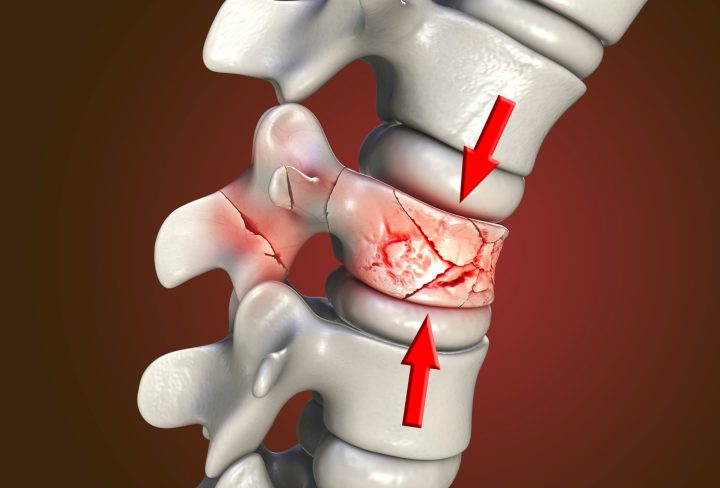Vertebral compression fractures (VCFs) occur when the vertebral body of the spine collapses or fractures due to weakened bones.
VCFs can be a result of osteoporosis, trauma, or other underlying medical conditions. VCFs can cause severe pain and can lead to complications like spinal cord injury or nerve damage if left untreated.
Symptoms of Vertebral Compression Fractures
- Sudden onset of back pain
- Pain that worsens with activity and improves with rest
- Limited mobility
- Difficulty standing or walking
- Height loss
- Curvature of the spine
Causes of Vertebral Compression Fractures
- Osteoporosis
- Trauma, such as a fall or car accident
- Cancer that has spread to the spine
- Certain medications, such as long-term use of corticosteroids
Risk factors of Vertebral Compression Fractures
- Age (as bone density decreases with age)
- Gender (women are at higher risk than men)
- Family history of osteoporosis
- Low calcium and vitamin D intake
- Smoking
- Sedentary lifestyle
- Certain medical conditions, such as hyperthyroidism or rheumatoid arthritis
Treatment of Vertebral Compression Fractures
Your doctor will perform a physical examination and may order X-rays, MRI, or CT scans to confirm the diagnosis.
Treatment may include:
- Pain management with medications
- Rest and activity modification
- Physical therapy and rehabilitation
- Bracing to support the spine
- Minimally invasive procedures to stabilize the vertebral body (Kyphoplasty or vertebroplasty)
- Surgery (in severe cases)
Your doctor will suggest the best treatment that suits you.
Vertebral Compression Fractures: Preventive Tips
- Take adequate calcium and vitamin D intake
- Perform regular exercise to strengthen bones and muscles
- Quit smoking
- Limit alcohol intake
- Take fall prevention measures
Facts About Vertebral Compression Fractures (VCF)
Myth: Only older people get VCF.
Fact: While VCF are more common in older people, it can occur at any age.
Myth: VCF always requires surgery.
Fact: VCF can often be managed with conservative treatments like pain management, physical therapy, and bracing.
FAQs: Vertebral Compression Fractures (VCF)
How long does it take to recover from a VCF?
Recovery time varies depending on the severity and treatment plan. Some people may recover within a few weeks, while others may take several months.
Can I exercise after a VCF?
Yes, exercise can help strengthen bones and muscles and improve mobility. Your doctor will recommend the appropriate exercises for you.
FAQs: Vertebral Compression Fractures (VCF)
Can a VCF cause permanent disability?
In severe cases, a VCF can lead to complications like spinal cord injury or nerve damage, which can result in permanent disability.
However, with proper treatment, most people with VCF can recover and resume normal activities.

